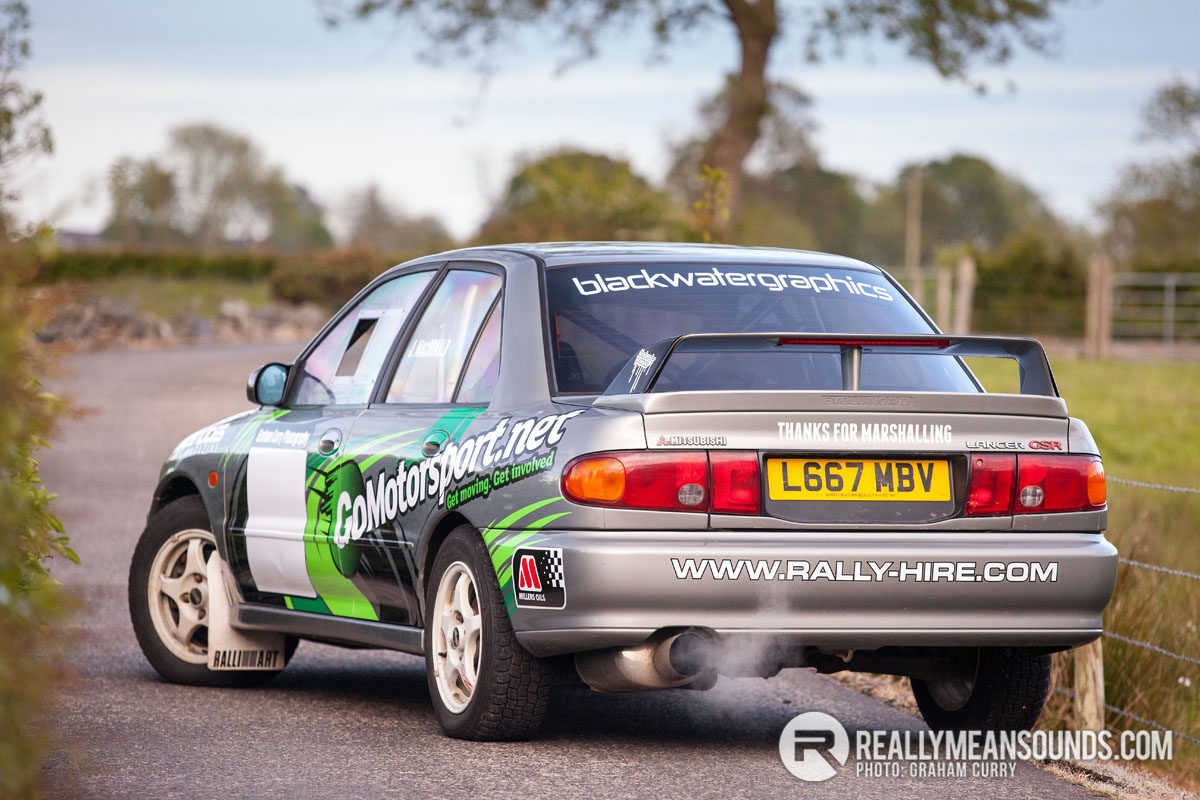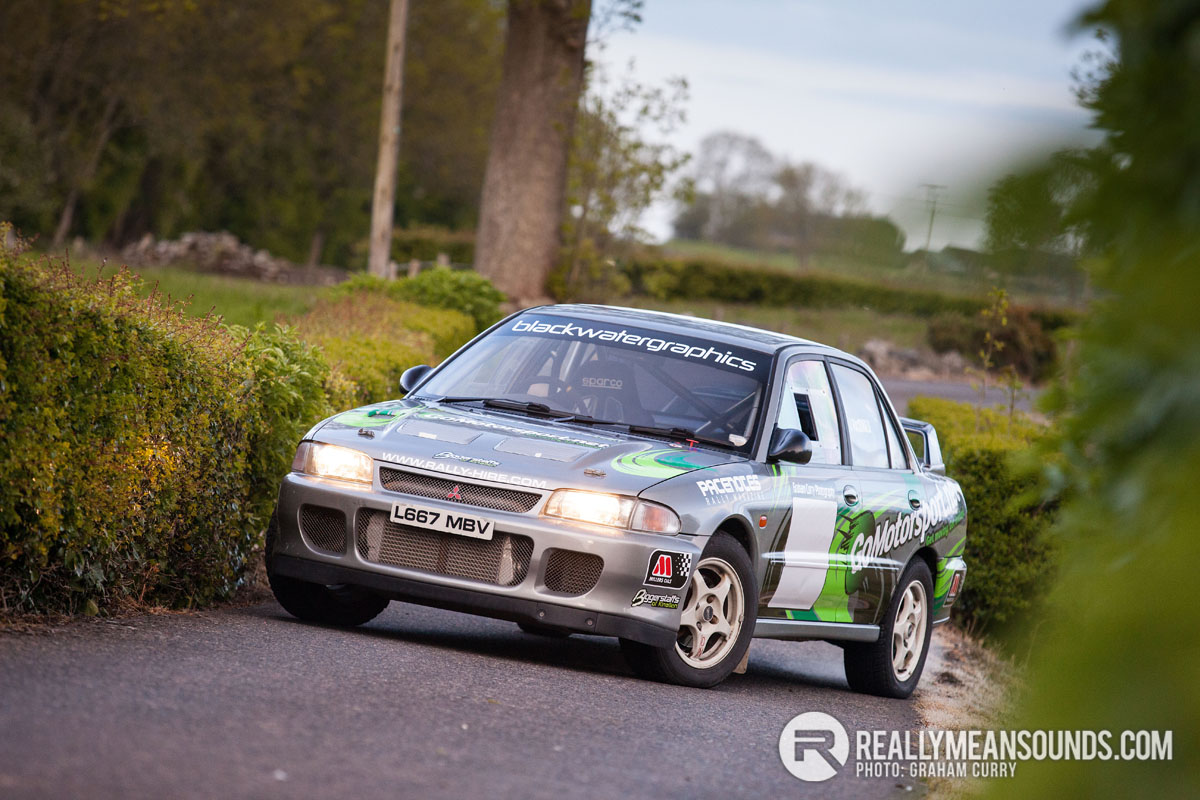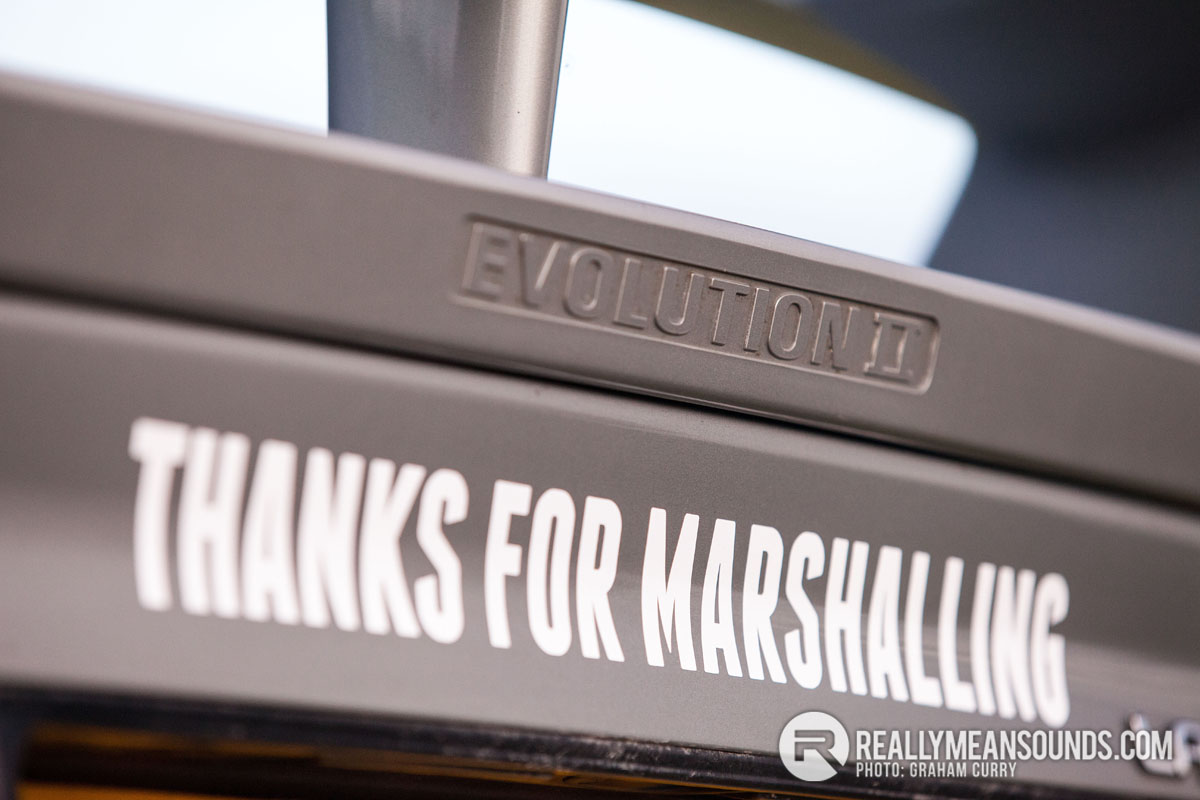Fancy doing a bit of rallying but think it’s out of reach? Well it might just be more affordable than you think.
For almost two decades, Irish rallying has been renowned for having a large number of World Rally Cars competing at the sharp end of the sport. But you don’t need to spend hundreds of thousands of pounds to have a bit of fun.
In fact, as Jonathan MacDonald admits, there is something to suit everyone’s budget and while stage rallying can be a bit more expensive, you can start competing in motorsport from as little as £20.
Jonathan is the Regional Development Officer for motorsport in Northern Ireland. He has been tasked by the Motor Sports Association (MSA) – the governing body of four-wheeled UK motorsport – to promote the sport around the country through the ‘Go Motorsport’ scheme.
He also rallies this 21-year-old Mitsubishi Lancer Evo 2, a car which he takes to schools and colleges to show students what motorsport is all about. The budget required to run this car is a far cry from the deep pockets needed for a top spec World Rally Car yet it still provides plenty of thrills and can be reasonably competitive.
“You can pick up one of these cars ready to rally from as little as £6500, depending on the specification,” MacDonald revealed. “Granted, there are not many that come up for sale so you might need a bit of patience to wait for the right car but if you fancy a bit of reasonably cheap stage rallying in a four-wheel-drive vehicle, the early Evos are perfect.”
He added: “They can be fairly competitive too. Don’t expect to win rallies but top 10 results are achievable. My Evo 2 is lighter than the more modern machinery which helps, and because there isn’t as much money wrapped up in the value of the vehicle, I feel more content when driving it hard!”
This particular Evo 2 was originally a road car that was imported from Japan in 2004 by Larne man Francis McAlister. Francis, who has an Auto Repairs business in Carrickfergus, converted it into a rally car with a friend. They stripped out all of the cloth interior and seats before adding the required safety equipment such as roll cage, bucket seats, safety harnesses and fire extinguishers.
“With the exception of the additional safety equipment, it’s just like an Evo 2 road car but with a roll cage,” MacDonald told RMS. “There are some other minor differences. I think the front intercooler has been upgraded at some point and I put a limited slip differential in the rear.”
“When building the car, Francis also made a few other subtle modifications such as changing the battery to a lighter race battery which was then relocated in the boot. And the turbo has a 34mm restrictor to conform to rally regulations.”
The beauty of keeping a car in next to standard specification ensures that reliability is high. This Evo 2 still runs with its original ECU and there have been no major power upgrades, which would put more strain on other parts of the car. That helps to keep costs down too.
“It’s very tempting to aim for more power but that brings headaches of its own,” MacDonald said. “As it sits, the car has a reasonable amount of power and seems to be fairly reliable. In the right conditions – usually when damp or greasy – it can spring a few surprises.”
Mitsubishi’s official 1994 book figures for the car show that its two-litre turbo engine outputs 260bhp. Interestingly, at the time of its launch, a motoring magazine carried out a three-way comparison test of an Evo 2 with an Impreza WRX and Celica GT-Four WRC. The Evo was almost one second quicker than its two rivals over the standing quarter-mile and stopped the clocks on the 0-60mph test at 4.7 seconds, compared to the Celica’s 5.5s and Subaru’s 5.6s times.
This Go Motorsport liveried Evo is likely to be shy of those figures, thanks to the turbo restrictor that’s required for stage rallying, but it can still set some impressive stage times.
At this year’s New Year Stages Rally, which was based at Kirkistown Race Circuit in January, Jonathan and navigator Stuart Biggerstaff took the car to seventh overall – behind four World Rally Cars, an Evo 9 and a potent Mark 2 Escort!
“That’s proof of the pudding that you don’t need to spend a fortune to get a car that’s reasonably competitive,” MacDonald said. “OK, if I was to take the car on to closed roads, it would be a different story as the suspension isn’t suitable for our bumpy lanes. I’d need a better setup in that department before venturing there but I only do a handful of events each year and for a clubman competitor, events based at race circuit venues tend to be more affordable.”
So if any of our readers fancy trying their hand at stage rallying, what else do they need?
“There are a few initial one-off costs,” MacDonald said. “The first thing they need to do is buy an MSA ‘Go Rallying’ starter pack (£95) and then complete their BARS rally licence test (£180). Links to purchase the pack can be found online at gomotorsport.net and then the test can be completed at Superdrive Motorsports Centre near Portadown or at Rally Storm near Omagh.”
“After that, they need to join a motor club (£10+), buy a race suit (£300+), helmet (£150+) and a car! Finding a few friends who are good on the spanners also helps and they’ll also need someone who is prepared to sit in the co-driver’s seat and read a map or pace notes.”
He added: “From 2016, competitors are also required to use front head restraints but I’m sure there will be businesses hiring these out at rallies so competitors won’t need to buy their own.”
A car transporter is also useful to have, although these can be hired from various outlets to save you from buying one. Or you can do what Jonathan does – insure the rally car for road use and drive it to and from events!
“There are a few initial outlays but once you have everything in place, it’s a case of maintaining the car,” Jonathan said. “Some things like seats, harnesses, suits and helmets are ‘dated’ and can only be used for a set number of years. This is to make sure everyone stays as safe as possible when they’re rallying.”
“Getting a few sponsors on board can help with the cost of things too,” he added, “and navigators contribute towards costs such as entry fees, which are usually around £180 for a rally based at a race circuit venue.”
“If you were to buy a cheap car that’s ready to rally, perhaps a Nissan Micra or Peugeot 205 for example, you could be on the start line at your first event for less than £6500.”
Other Options
If that still sounds a tad too rich, there are other cheaper options that let you experience the thrill of rallying. If you don’t want to buy your own car, you can opt to navigate. All you need is a race suit, helmet, navigator’s licence (no need for a BARS test) and become a member a motor club. Then find a willing driver to take you on board!
Alternatively, Targa Rallies offer a cheaper form of motorsport. These events can be contested in standard road cars (with some exceptions) without the need for race suits, helmets or roll cages. Entry fees usually start from around £50 and events consist of a variety of tests where competitors must take the correct route around obstacles. Popular cars include Mazda MX5s and Nissan Micras.
Cheaper again are Autotests and Autosolos, which provide a great starting point for anyone interested in motorsport. With the exception of Production Car Autotests, these are ‘driver only’ events – no navigators are permitted – and are a real test of skill and memory. They help build a driver’s car control and standard road cars can be used.
16-year-old competitors are permitted to take part, while 14-year-old drivers can enter Production Car Autotests. Entry fees are typically around £15. Autotesting might seem like a far cry from stage rallying but they provide a perfect grounding for all motorsport disciplines.
Not sure?
If you’re still not sure if you would like to take the plunge, why not head along to the N.I. Speed Weekend at Balmoral Park, Lisburn, on 29/30 August? There you will be able to see many different types of motorsport, from rallying to off-roading, and you will even have the opportunity to jump in as a passenger in the Production Car Autotest vehicles.
If you decide that competing isn’t for you, there are many more options that will let you get involved. All motorsport events require volunteer marshals to help them run safely…and you can marshal from the age of 11!
If you want to find out how you can get involved in the Northern Ireland motorsport scene, contact Jonathan for advice on 07989 283055 or email northernireland@gomotorsport.net. Alternatively, log on to gomotorsport.net or the Association of Northern Ireland Car Clubs’ website, anicc.org.uk, where you can find a full calendar of all four-wheeled motorsport events in Northern Ireland.







